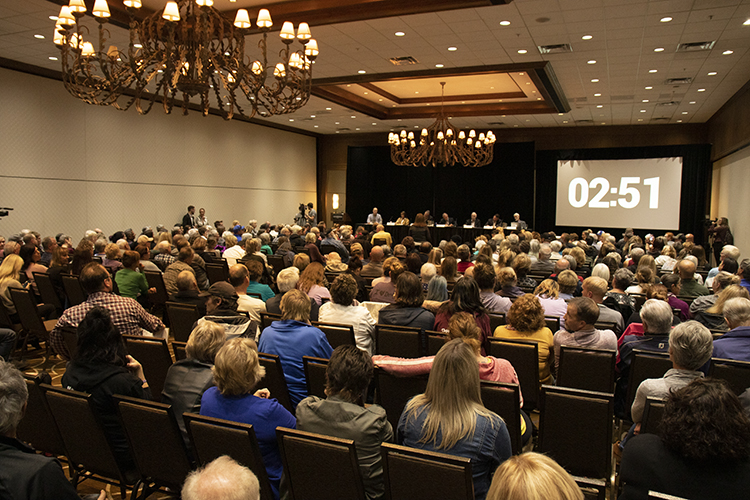The air was tense as over 250 people filled a room at the Cambridge Inn and Suites in Red Deer last night as part of the provincial review on supervised consumption services (SCS).
Six of the official review panel members were in the meeting: Rod Knecht (chair), Geri Bemister-Williams (vice-chair) of Red Deer College, Dr. Ray Baker, Steve Cormack, also of Red Deer, Paul Maxim and Dr. Rob Tanguay.
Attendees were asked to direct their speeches to answer two questions: “How do you feel supervised consumption services have impacted this community, positively or negatively?” and “What future solutions or ideas should this committee consider that might help address some of the adverse or unintended social or economic impacts?”.
Shaune Fandrey is an opponent of the OPS, but said there are a lot of other issues that need to be addressed if there is going to be a change in the overall realm of addictions in Canada. Fandrey is a business owner in the downtown core, and is also a foster parent.
“These solutions, I call them band-aid solutions, are incredibly frustrating to me. One of the points I went up there to discuss was that I hear a lot about how harm reduction and safe consumption saves lives - I have two of my former fosters living on the street right now, and to say that they’re living is crazy. They barely exist. That’s incredibly sad to me,” she said, adding that she’s incredibly frustrated that the government is saying they simply need to do more studies.
“We know the root causes - one pof the biggest root causes of addiction is trauma. SAfe consumption sites don’t reduce trauma. My loved ones go right back out on the street. They get robbed, they get beaten, they get sexually assaulted - and frankly, they do those things to other people as well. We’re certainly not reducing trauma there. And I keep raising the babies, who are a product of trauma. If we don’t start dealing with that trauma, the mental health support they need, the recovery they need, we just prolong misery.”
Many of the comments were leaning against the OPS, including suggestions that getting rid of all services downtown would eradicate drug users from the area, notions of placing all drug users in jail with harsher penalties, and a few extreme comments such as creating "a safe execution site".
A local family doctor also took his turn at the mic, Dr. Michael Mulholland, who helped to create the medically-centred detox program at Safe Harbour Society. Dr. Mulholland explained that prior to the opening of the OPS, Red Deer saw 47 deaths per 100,000 population, making it the highest rate of deaths in Alberta.
“Those people that I serve at the detox, those are your mothers, fathers, sisters, brothers - they are people. They are our community. They’re not choosing this. I can see the results of the hospital of what happens when people use. If you think this is something that people have chosen and you think you can punish them into recovery - I wish it were that easy. I wish we didn’t have this problem,” he said.
“Johann Hari is an expert in addiction, and if you want to think about what this is all about, remember this. He said, “The opposite of addiction is not sobriety. The opposite of addiction is connection.””
He said that the problems people were voicing were in the City prior to the OPS and that they would be there after. He closed his statement by saying, “One thing I can tell you after 30 years of being a physician, is that I cannot help someone who is dead, 100 per cent of the time.”
The province will wait on edge as the designated panel presents their information to the provincial government later this fall. If you would like to have your say on safe consumption services, a survey is available on the Province of Alberta website.








